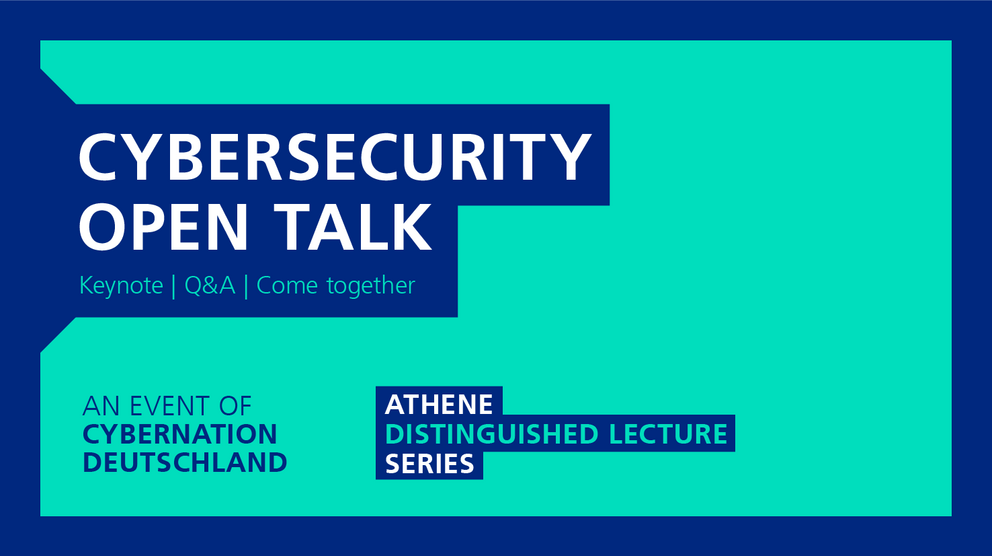
17.10.2023: Katie Arrington, LD Innovations LLC
Biografie

Katie Arrington is the former Chief Information Security Officer for the Undersecretary of Defense for Acquisition and Sustainment at the Department of Defense CISO(A&S) and current owner of LD Innovations LLC. As a Senior Executive Leader with demonstrated ability to build relationships and deliver results across multiple sectors including the Department of Defense, Federal Agencies, State and Local Government, public sector, private sector, and nonprofit organizations, with one major goal and that is to advance the America First agenda. With Over 25 years of sustained engagement and impact in public service, national security, cybersecurity, technology, economic development, and education, all with a focus of reform, scalability, and sustainability. Proven leader in various roles as a Senior Executive and manager, elected Government official, technical solutions engineer, entrepreneur, and business leader. Unique understanding of how legislation and National policy are promulgated and implemented across the Federal Government, industry, and by our citizens. Recognized change agent responsible for driving transformation within every echelon of government in the areas of cybersecurity and critical infrastructure. Keenly adept coalition builder with strong partner networks across government, industry, the American public, and with allied partners to develop the talent, techniques, technology, and tools to advance our common National Security and National Defense interests with policy and legislation.
Ms. Arrington led the team who created the Cybersecurity Maturity Model Certification (CMMC) and is currently leading efforts that will help to ensure a robust Supply Chain Risk Management (SCRM), establish Defense Industrial Base Security and Resilience.
Before assuming her position in OUSD(A&S), Katie has an extensive career as a legislator and senior cyber executive. Katie was a candidate for South Carolina US House of Representative 2018, 2022 and a South Carolina State Representative for 2 terms. She has substantial experience and capabilities in cyber strategy, policy, enablement, and implementation across a wide range of domains, including DoD, Federal, Healthcare and State. She acquired her experience in cyber over the past 17 years with Booz Allen Hamilton, Centuria Corporation and Dispersive Networks.
The Criticality of Cybersecurity in Supply Chains
Abstract
In today's interconnected world, supply chains have become increasingly vulnerable to cyber threats. A single breach in the supply chain can have far-reaching consequences, disrupting operations, compromising sensitive information, and causing significant financial and reputational damage. This abstract highlights the importance of cybersecurity in supply chains and emphasizes the need for robust measures to safeguard against cyber threats.
Firstly, supply chains are highly complex and interconnected networks involving multiple stakeholders, including suppliers, manufacturers, distributors, and customers. This complexity creates numerous entry points for cyberattacks, making it crucial to implement robust cybersecurity measures. A breach in any part of the supply chain can propagate rapidly, affecting multiple stakeholders and disrupting the flow of goods and services.
Secondly, supply chains often involve the exchange of sensitive and confidential information, including intellectual property, customer data, and financial records. Cyberattacks targeting this valuable data can lead to financial fraud, identity theft, and the compromise of trade secrets. Effective cybersecurity measures, such as encryption, access controls, and regular data backups, are essential to protect this critical information from unauthorized access and potential exploitation by malicious actors.
Thirdly, the globalization of supply chains has increased their exposure to geopolitical risks and state-sponsored cyber espionage. Nation-states and cybercriminal organizations may target supply chains to gain a competitive advantage, disrupt economies, or compromise national security. Robust cybersecurity practices can help detect and mitigate these advanced persistent threats, safeguarding the integrity of supply chains and protecting national interests.
Moreover, supply chains are becoming increasingly reliant on digital technologies and Internet of Things (IoT) devices. While these technologies offer numerous benefits, they also introduce new vulnerabilities. Weaknesses in IoT devices or outdated software can be exploited by cybercriminals to gain unauthorized access to the supply chain and launch attacks. Implementing stringent cybersecurity protocols, such as regular software updates, vulnerability assessments, and network segmentation, is imperative to mitigate these risks.
Furthermore, the interconnected nature of supply chains means that the cybersecurity posture of one entity can impact the entire network. Weakest links in the supply chain can serve as attractive targets for cyberattacks, allowing threat actors to infiltrate and compromise the entire network. Therefore, it is essential for all stakeholders in the supply chain to prioritize cybersecurity and collaborate to establish consistent cybersecurity standards and best practices.
In conclusion, cybersecurity is of paramount importance in safeguarding supply chains against cyber threats. The complexity, criticality of information exchanged, geopolitical risks, and reliance on digital technologies necessitate robust cybersecurity measures. By prioritizing cybersecurity and adopting proactive and collaborative approaches, supply chain stakeholders can mitigate risks, protect sensitive information, maintain operational continuity, and uphold the trust of customers and partners.
